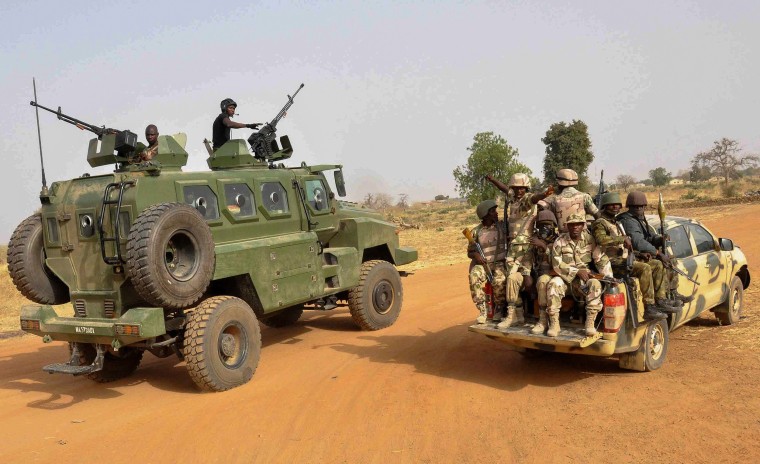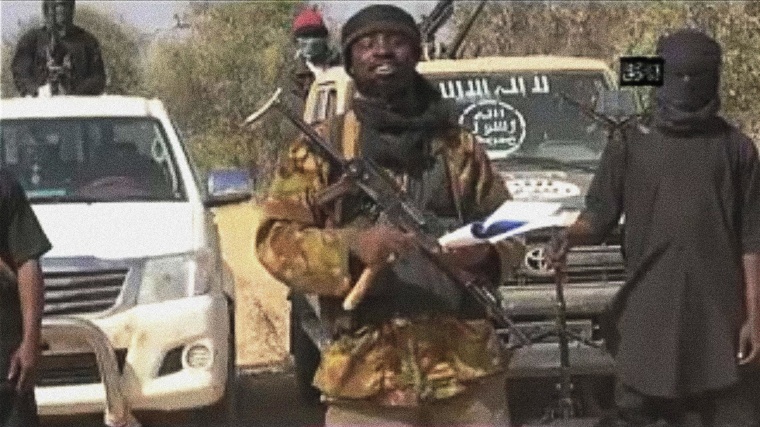Four different African nations now want to kill Abubakar Shekau, the leader of Boko Haram, because they think that without its charismatic chief the terror group that controls a huge chunk of Nigeria could wither and die.
But Shekau’s enemies have “killed” him before, and each time Shekau has resurfaced with a mocking video disproving the claim. And even though the U.S. is now using drones to aid the multinational African task force tracking Shekau, U.S. officials say finding and killing him remains a challenge.
Last week, Chadian president Idriss Deby, whose country has joined Nigeria, Cameroon and Niger in pursuit of Shekau, called on him to surrender or die in the clearest indication of how important Shekau is to the task force.
"Abubakar Shekau must surrender. … If he doesn't give himself up he will suffer the same fate as his compatriots," said Deby at a news conference.
Deby also said the task force has been tracking Shekau and knows where he is.
"He was in Dikwa two days ago," said Deby, naming a Nigerian town near the Chad and Cameroon border where the nation’s combined forces fought a pitched battle with Boko Haram last week. "He managed to get away but we know where he is. It's in his interests to surrender."
U.S. officials understand and support the emphasis on killing Shekau. One senior intelligence official said Shekau was “integral” to Boko Haram’s battlefield success and noted that “there doesn’t seem to be a charismatic leader below him.”
"Senior Nigerian security officials with whom I have spoken make no secret of their desire and that of their allies to target Boko Haram's Abubakar Shekau,” said J. Peter Pham, director of the Atlantic Council’s Africa Center.
Although operating mostly in Nigeria, Shekau has moved across the area's porous borders into Chad, Niger and Cameroon, on occasion. One U.S. official said he's known to visit Chad where two of his favorite wives live. The multinational task force stalking him is primarily made up of forces from Nigeria, Chad, Cameroon and Niger, with Benin also playing a role. The Chadian army is the largest and best trained of the four main participants, say U.S. officials.
The U.S. has offered intelligence help to the task force. One Pentagon official said the U.S. has a drone base in Niger that could be engaged in the hunt for Shekau. In the past, Nigeria has resisted such help, but said the official, "that's changed now."
Rear Admiral Gabriel Okoi, the head of Nigerian intelligence, seemed to reference the drones in an Atlantic Council event in Washington, D.C., on Wednesday, saying “the Americans … are helping us with air assets … that are outside Nigeria.”
But African officials have complained both publicly and privately that the information arrives too late. As Okoi said Wednesday, “It is a day after that, 24 hours after that, that we get information, 'Oh, this is what we saw.' Twenty four hours is too late for us."

Given the lag, and Shekau’s elusive nature, one U.S. official doubted Chadian President Deby’s claim to know where Shekau is. The official said sightings of Shekau are rare and public targeting could make capturing him even more difficult. "This is one of the most wanted men in the world," said the official, "and targeting him could tip him off and cause him to reassess his security situation and cause him to change his patterns."
John Campbell, the former U.S. ambassador to Nigeria who now heads the Africa Center at the Council of Foreign Relations, said that failed attempts to capture him in the past have made Shekau a mythical figure.
"The Nigerian Army has claimed to have killed him multiple times, so often that some see him as more of a nom du guerre for collective leadership," said Campbell.
At the very least, losing Shekau would hurt Boko Haram in the short term, as the group's shura council, its ruling committee, would have to elect a replacement. Shekau himself succeeded Mohammed Yusuf, the group's founder, who was killed in 2010 by Nigerian forces.
The movement might then break up into smaller jihadi groups that would continue to terrorize the area. Still, U.S. officials note, taking out Shekau would be a coup, noting it's he who authored the strategy of scorched earth attacks like the one that may have killed 2,000 civilians near Lake Chad.
"His entire on-stage persona is that of a bin Laden wannabe, from the weapon-wielding backdrops, the incessant video releases, etc.," said Emmanuel Ogebe, a Nigerian human rights lawyer who has long studied Boko Haram.
Despite his frequent videos, Shekau’s bio remains sketchy. He is believed to be in his late 30s, but both his birthdate and his birthplace are unknown. Most accounts say he is from Niger, but Niger, which wants nothing to do with him, says he was born in Nigeria's Yobe State. His mother has long lived in the Nigerian city of Maiduguri.
His early years are also wrapped in mystery. He received little formal education, but because of a photographic memory, learned to speak multiple languages -- Hausa, the main language of north Nigeria, a little English, "very good Arabic," as well as his native Kuneri, said one U.S. official.
Whether the multinational force can find him and kill him remains uncertain, but the 8.700-man fighting force has had recent success in liberating villages that had been controlled by Boko Haram for years. "They've had more success in the past three weeks than they've had in the past three years," said Peter Pham.
Said Chadian President Deby,"We are going to win the war and we are going to wipe out Boko Haram, contrary to what certain media think. The Chadian and Niger forces will continue their mission to finally put an end to this shadowy group."
